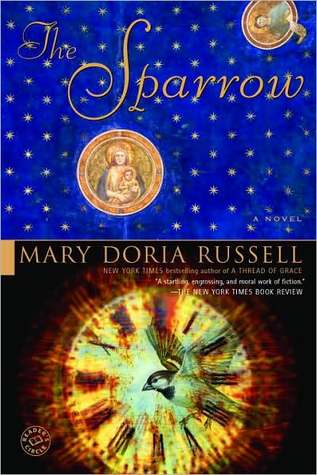Sunday night I finished The Sparrow by Mary Doria Russell. I read it as part of the sci-fi–fantasy group over at Goodreads. I love Goodreads, but it irks me that they combine sci-fi and fantasy that way. Anyway, back on subject, The Sparrow was published in 1996. The paperback edition I read was released in 2008. 
Overall
I give the book an overall grade of A-. I have never read anything by Russell before, so I didn’t know what to expect. I had heard about the book and knew that it was highly regarded as one of the best sci-fi books of the past generation and she is favorably compared with the masters of the genre. I can see why. The book is interesting throughout. It is not a perfect book, as I will get to below, but a well-thought-out plot with fascinating characters is more than most sci-fi books achieve. It gets a “minus” because the whole Jesuit in space thing has been done a time or two and the adverb issues which I address below.
Plot
Without spoilers, the story is about the discovery of life on another planet in the not so distant future. Before governments can form a response, a group of Jesuits lead an interstellar expedition of people from various technical and religious backgrounds to investigate. As you might imagine, all does not go well.
Strengths
This book has three strengths.
1. The characters are written well. This is brought out with crisp dialogue and believable action. Russell’s intelligence and research on Jesuits, science, linguistics, and history makes every character human. The only flaw in her characterizations are that every major character is just a little too competent and perfect, but I can live with that.
2. There is an almost perfect balance in the book between science and fiction. It is in this way that the book reminds me of Ray Bradbury.
3. The book asks sincere theological questions without giving pat answers, either for or against. Russell seems to delight in the intentional ambiguity.
Weaknesses
1. The pacing of the book is sometimes less than ideal. About one third into the book it felt like she kept repeating the same basic things. She could have told the same great story with 50,000 fewer words.
2. Russell is guilty of adverb abuse. She loves, loves, loves, loves to have people doing “ly” things. For example:
D.W. lied cheerfully
Two lines later:
Emilio said seriously
I just pulled that out randomly by opening the book (page 51). They are all over the place.
3. At times I lost the POV. Sometimes she would switch right int he middle of a paragraph with no warning.
Audience
There are some mature themes to be sure, and the language is rough. Who knew Jesuits talked like that? If you are easily offended at different religious worldviews, you shouldn’t read this book. However, if you like to see how others might wrestle with difficult issues, then this book is for you.
There is a sequel to this book called Children of God. I do not know when I will read it, as my TBR pile has grown out of control, but I will indeed read it. In fact, I’ll probably buy it today at Amazon.

7 responses to “JESUITS IN SPACE–A REVIEW OF THE BOOK “THE SPARROW””
Thanks for the review. You piqued (peeked!) my interest.
i think you would likely enjoy it.
[…] mind I need to know where things are because those things matter when telling a story. I recently read a novel that had people on a spaceship and, although the book was good, I never could get a mental map of where they were on the spaceship […]
I agree about the pacing; it felt like it took forever to launch the Jesuits into space. When the alien encounter did finally come, it had more impact because of all the ordinary events leading up to it. But, as you mention, Russell probably could have accomplished the same effect in fewer words.
thanks carson for reading and commenting. over the past decade, books have gotten bigger, and i think for the most part this is unnecessary. i still believe less is often more when it comes to word count.
[…] me wrong, I love space stories. I’ve read three recently that I really liked (The Sparrow (click here for my review) and The Martian, and I also read Sonia Craig’s oustanding yet to be released […]
[…] on Mars means we can baptize on Mars. That means space is ready for Baptists! It remains to be seen, however, if Baptists are ready for […]